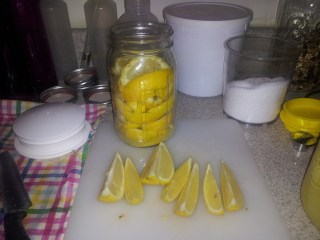If you’ve never made preserved lemons before, you are completely missing out. I got interested in the idea of preserved lemons after getting tired of forgotten fresh lemons drying out and going bad. It’s always frustrating to throw out wasted produce. Especially lemons. When I received my first ever preserving book, Canning for a New Generation, one of the first recipes I tried was “Preserved Lemons”. Let me tell you: Preserved Lemons have changed my life. I can now order lemons in bulk when they are seasonally at their best and enjoy the taste of lemons all year long! As much cooking – and*ahemdrinkingahem* – as I do, one quart of preserved lemons lasts me about a year. Preserved Lemons are pickled lemons that have been pickled in their juices and salt. You can use the pulp of the preserved lemons in recipes, however, keep in mind that it is salty and briny. The magic of the preserved lemon is in the rind. The rind becomes a beautiful, soft, chewy pickle that is palatable and goes a long way in recipes. I know it seems counterintuitive to eat citrus rind but trust me on this. In the middle of summer when lemons are not at their best – or when you just don’t want to go to the grocery store – I have substituted finely chopped preserved lemon rind in any recipe that calls for lemon zest. I have whirred up a few slices in the blender and used the paste in recipes that call for lemon juice. There’s a great lemon vinaigrette and a great Preserved Lemon Roasted Chicken recipes that I use with these lemons (those recipes to follow in the future). Pretty soon, you will find that your refrigerator feels empty without a jar within reach.
First you want to grab about 4 lemons (you may need more, you may need less. It all depends on the size of your lemons) with limited, to no, blemishes on the skin – remember, the pickled rind is what we will use in the majority of recipes. 4 good sized lemons will generally fill one quart jar. Ensure that you clean and scrub your lemons well and thoroughly dry them. Next, slice them into eights (or smaller if you have really big lemons).

Grab one sterile quart jar; I find that wide mouth quart jars are easier to make preserved citrus in because you can get your hand in there to squish the citrus down. However, regular mouth jars are cheaper and you can use the end of a wooden spoon to mush them down. Take a pinch full of kosher salt and sprinkle it into the bottom of your jar. Layer your first 4 to 6 slices of lemons into the jar, squish them down to release some of their juices, take a generous pinch of kosher salt and spinkle on top of the layer. Keep repeating until you have layered your lemon slices and kosher salt all the way to the neck of the jar (You want to leave some space for the lemons to expand as they will absorb some of their juices after they have expressed them.) Screw on the lid and ring and let the lemons sit on your kitchen counter, or kitchen window sill, for 24 hours. The lemons should express some of their juices. After 24 hours, you will add fresh lemon juice to cover the lemon slices. Keep your lemons on your counter/sill for a week. After a week, place them in the fridge. After about a week in the fridge, check your lemons and if they have expanded, you will need to add more lemon juice to cover. They will keep for about a year (although I have kept them for longer).

Preserved Lemons
Ingredients
4 Lemons
4 T Kosher Salt
Directions
1. Slice 4 lemons into eights (or smaller if you have really big lemons)
2. In a sterile quart jar, sprinkle about a half tablespoon (I use one generous pinch) into the bottom of the jar. Lay around 6-8 slices into the jar and push them down until they start to express their juices.
3. Sprinkle half tablespoon over the layer of lemons slices
4. Repeat layering lemons and kosher salt until you fill the quart jar up to the neck.
5. Let the lemons sit on your counter for 24 hours. After 24 hours, fill the quart jar with fresh lemon juice, ensuring that you cover the lemons.
6. Let the lemons sit for a week.
7. Label and place in the fridge. After a week in the fridge, check your lemons. If they have expanded, add more lemon juice to cover the lemons. They will keep for about a year in the fridge.


